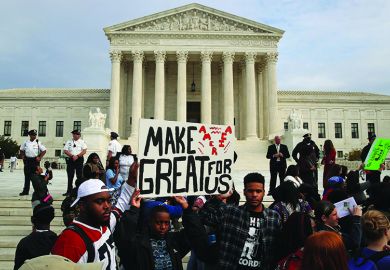The two leading US-based groupings of college admissions counsellors are facing internal splits over partisan politics and their degree of responsibility to fight back against social inequities.
In the case of the National Association for College Admission Counselling, the question centres on whether NACAC should hold its annual conference this autumn in Texas – one of several US states where conservative administrations are seen to be harming marginalised communities.
For the Independent Educational Consultants Association, the dissent appears to run deeper, with a segment of members pushing a campaign of internal resistance to the IECA’s overall promotion of diversity awareness.
That recently culminated in the IECA shutting down a division of its mailing list service – or “listserv” – that more conservative members of the group had created, saying that its conversations had grown abusive.
“We didn’t close it down because of the political slant,” the IECA’s chief executive officer, Mark Sklarow, said. “It was closed down because it violated policies that we keep about professional interaction and keeping to issues.”
Some of his members feel otherwise. One New York-based admissions consultant, Daniel Hughes – a leading voice on the now-banned listserv division, which called itself “The Heterodoxy Group” – accused the IECA of going overboard in pushing diversity awareness on its members.
“What is increasingly obvious,” Mr Hughes wrote on the server, “is that leadership of this organisation will define anything they agree with (and is left of centre) as being done in the spirit of ‘inclusion and diversity’ (redefining traditional understandings of gender, endlessly sending out a political statement about ‘systemic racism’) and anything they don’t agree with personally and/or not fully woke, as not to be allowed.”
The dual controversies reflect emotional political divisions across wider US society that are increasingly infiltrating US higher education. The 25,000-member NACAC largely represents college admissions counsellors who work within US high schools, while the 2,500-member IECA assists a much smaller but growing cohort of private advisers who provide fee-based advice on the college admissions process to individual students and their families.
NACAC’s leadership has been facing months of pressure to move the annual conference it has planned for September from Houston, due to policies by Texas governor Greg Abbott seen as discriminatory towards transgender people. That concern intensified recently with the state government declaring that gender transition care for minors should be treated as child abuse under state law.
NACAC joined several other educational and child welfare groups in denouncing a “flood of discriminatory, anti-LGBTQ+ legislation” in Texas and other US states. But the association said it was sticking with its choice of Houston, because of both the “immense financial repercussions” of a last-minute relocation and the opportunity it sees in Texas “to take a stand for our values”.
At the IECA, Mr Sklarow said he was saddened to see some of his members – with their professional calling to guide young students – unable to productively discuss their own political differences. The Heterodoxy Group grew unacceptable, he said, not for the political content, but because the discussions shifted to outside topics such as mandatory vaccination policies, and then degenerated into name-calling.
“It's upsetting, frankly,” Mr Sklarow said. “Not upsetting that there’s differences of political opinions…but it’s upsetting for that coarseness, that inability to have a reasonable measured conversation on the issues,” he said.
The IECA will soon open another section of its mailing list for political topics, but only after taking care to set rules that it hopes will keep the discussions civil.
Register to continue
Why register?
- Registration is free and only takes a moment
- Once registered, you can read 3 articles a month
- Sign up for our newsletter
Subscribe
Or subscribe for unlimited access to:
- Unlimited access to news, views, insights & reviews
- Digital editions
- Digital access to THE’s university and college rankings analysis
Already registered or a current subscriber?








